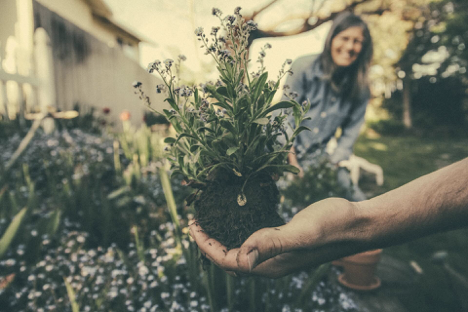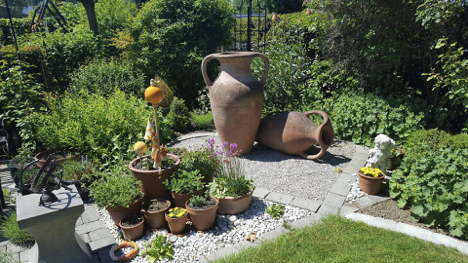
Who doesn’t love to wake up in the morning and sit next to flowers and green trees? You’ve probably watched in movies where someone sits on the chair with a cup of tea while staring at the green aura in front of the house.
Well, you can have the same experience if you give a little bit of time to gardening. Once you have a garden in front of your house, the celestial beauty will always give your mind a refreshing and soothing touch. Successful people tend to keep gardens and keep themselves busy gardening to wave off their stress.
As beautiful as it seems, gardening needs a team-up of proper work, enthusiasm, and right skills. To make sure you can improve your skills in gardening, I’m here to give you a tour of 10 tips to enhance your gardening skill. So without further ado, let’s dive in.
1. Do Your Research and Seek Advice from Experts
First thing’s first, you gotta read a lot and research a lot. Look at the present condition of your garden and ways to improve it. Don’t expect that you’ll be able to grow all type of plants in your area. Rather, go for the ones that fit your place and you’ll see you’re getting the best results.
You also need to decide if you want your garden to be on high or low maintenance. As a result, you’ll be able to dictate the type of plants you chose. Successful gardeners always research how to tackle jobs in the garden.
Talk to your fellow gardeners about new ideas and innovation. It is true that you can learn a lot of things by reading books and certain blogs. However, the real-life experience will always take you one step ahead. Gardeners who have been working for years will let you know the dos and don’ts which will make your work easier.
2. Learn about Design
Set a mesmerizing design for your garden inside your head. Calculate the space your plants will require to grow. If you have a small space, it can be harmful to your plants.
If you have friends, ask them to give you innovative decoration ideas.
Avoid placing plants very close to each other as it will make a disturbing crowd, for which, it may negatively impact their growth. Learn how to make proper spaces for plants so that they can grow successfully. Always take pro-active steps in case of planting.

3. Soil Analysis
It’s a must to know if your soil can support plant life. You’re planning to grow flowers and vegetables but you forget to do your soil analysis, so it’s more like working all day without any result. Use best moisture meter for plants to know how much moisture the soil is. Through the process you can easily understand whether the soil need water or not to grow your plants.
Knowing about the pH of your soil is a must before planting anything. You should know which category your soil falls into. Is it alkaline, acidic or neutral? After finding what type of soil you have, it’s mandatory to know their differences.
Your plants will end up suffering from malnutrition if the soil you have is too alkaline or acidic. The fact that this soil type keeps plants from absorbing nutrients like nitrogen, phosphorus, and potassium, is the main reason for this problem.
Got everything figured out? Well, it’s time to know about the soil structure. If your soil is too sandy, it won’t be able to provide nutrients to your plants. On the other hand, the root of your plants may end up suffocating if you plant them into a soil where it has too much clay, which limits the access of water and air.
4. Know How to Sow Seeds
‘You reap what you sow’, well this what literally get from gardening. When you’re planting and sowing seeds, you have to take extra-careful measures.
First off, don’t expect anything from bad quality seeds. You’ll find plenty of good quality seeds in the market, get your hands on them and start sowing.
Know how to water them perfectly with warm water. Keep in your mind that colder temperature can slow down the germination process, as a result, it can put a negative impact on the plants’ life
Learn about the growth of the plant and how to handle them with care when they start growing their leaves. Trust me, you don’t want to grasp the stem of the plants, ‘cause if you do, you might just end up harming it. Rather, handle them with care gently.
5. Know How to Save Seeds
If you have friends who are gardeners, you can collect seeds from them which they grew themselves last season. As a result, you’ll be able to save your money.
Repeat this process every year and once you get the seeds, you can re-use it for the next season.
To make sure you can re-use your seeds perfectly, you can check out seeds libraries like Kansas City Public Library or Richmond, California Public library and grab some tutorials as well. They’ll teach you how to grow plants using the seeds that you grew previously
6. Get Some Ideas on Container Gardening
Do you have containers in your home that you don’t use? Well, they might come handy for letting you grow ridiculous amounts of food. You can grow different plants on plastic storage tubs and recycled food buckets.
That being said, you can check out Pinterest as it’s full of marvelous ideas for upcycled planters. You can have all kinds of vegetations by using the items you already own. All you need is the perfect guideline to help you up.
7. Attend a Fair, Summit or Symposium
If you want fast information about a whole bunch of gardening, I would suggest you attend a gardening symposium or a summit. Trust me, they help a lot learning new things.
You can try contacting or going in botanical gardens, academic institutions, and gardening clubs which often host these in spring or fall.
You can even search for the live online fair as they host on the internet as well. In many regional fairs online, you’ll often see Mother Earth News show many education events.
8. Try Reading Gardening Blogs and Books
A lot of people, in their initial stages of gardening, spend a considerable amount of time reading about others’ gardens on different blogs. You’ll find plenty of blogs on the internet that will give you lots of instructions regarding the skills on gardening.
As for reading books, you can try plenty of authors like Elizabeth P Stell, John Jeavons, Richard Merrel, etc. You’ll find lots of information and instruction in their books which can enhance your gardening skill.
9. How Much Water Do You Need?
Water can save lives as well as it can turn the tables by taking a life. Under watering can kill your plants but similarly, overwatering can turn out to be a threat.
It’s not rocket science to learn how to water your plants properly, both inside and out. If you learn good watering techniques, it will not only keep your plants healthy but also save your water bill.
10. Track Your Progress
Always make a note of what you’ve planted so that you’ll know when you can expect your plant to bloom. Make plans and make notes about what you want to implement in your garden.
Start with small changes and try something better and innovative every time you want to change or replace something. Always remember, the journey to the thousand steps, start with one.
Final Words
Gardening is fun but it needs a lot of hard work as well. People will see your success but you’re the one who’ll know how much effort you gave to achieve this. To make sure your effort doesn’t go in vain, you should always strive to improve your skills this is why going through these tips to enhance your gardening skill is always recommended.
